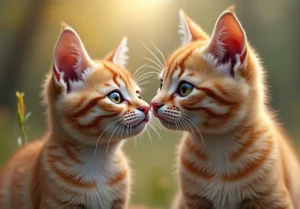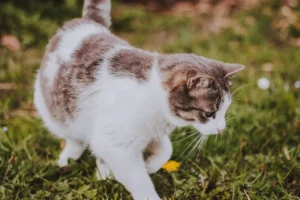Cats are known for their independent nature, often choosing to hunt alone rather than in packs like some other animals. Have you ever wondered why a cat prefers to hunt solo? Let’s explore the reasons behind this behavior.
Instinctual Behavior:
Cats’ instinctual behavior drives them to hunt alone. In the wild, cats are solitary hunters, a trait they carry from their ancestors who survived by relying on their own skills rather than teamwork. This behavior is deeply ingrained in domestic cats, pushing them to stalk and capture prey on their own. It’s not that they don’t enjoy the company of other cats, but when it comes to hunting, they prefer to go solo.
Efficient Predators:
Cats are efficient predators when hunting alone due to their remarkable agility, stealth, and focus. Without the distractions of other cats, they can fully concentrate on their target, utilizing their keen senses and quick reflexes to secure a successful hunt. Additionally, cats don’t have to share their spoils when they hunt alone, ensuring they receive the full benefit of their efforts.
- Furthermore, cats can adapt their hunting techniques to different types of prey when hunting alone. Their ability to switch between stalking, pouncing, and ambushing tactics allows them to effectively capture a variety of animals, showcasing their versatility as skilled predators.
Remember, when your feline friend exhibits their innate hunting behavior at home, it’s their natural instinct at play. Providing them with interactive toys and activities can help satisfy this primal urge in a safe and stimulating environment.
Territorial Instincts:
Cats are known for their strong territorial instincts, which play a significant role in why they prefer to hunt alone. In the wild, cats mark their territory through scent markings and vocalizations, creating a boundary that they defend against intruders. This territorial nature extends to their hunting grounds, as cats view their hunting area as an essential part of their territory that must be protected. By hunting alone, cats can focus on defending and protecting their hunting grounds without the interference of other cats, ensuring a successful hunt without competition.
Solitary Hunters vs. Group Hunters:
When it comes to hunting, cats have evolved as solitary hunters rather than group hunters. Hunting alone provides cats with several advantages that contribute to their success as predators. One key benefit of solitary hunting is the element of surprise. Cats can stalk their prey quietly and patiently without the noise or distraction of other hunting partners, increasing their chances of a successful kill. Additionally, hunting alone means they do not have to share the spoils of their hunt, securing a meal for themselves without competition. Furthermore, by hunting solo, cats can tailor their hunting strategy to their specific prey without having to compromise with the preferences or tactics of a group, resulting in a more efficient and successful hunt.
Benefits of Solitary Hunting for Cats: 1. Stealth and Precision: Cats can utilize their natural agility and stealth to approach prey undetected. 2. Personalized Hunting Strategy: Hunting alone allows cats to adapt their hunting techniques to the specific characteristics of their prey. 3. Efficient Meal Acquisition: Cats do not have to share their catch with others, ensuring they receive the full benefit of their successful hunt. 4. Independence and Control: Cats have full control over their hunting grounds and can focus solely on their own needs and preferences.
By understanding the territorial instincts and advantages of solitary hunting in cats, we gain insight into the unique behaviors and strategies that contribute to their success as skilled hunters.
Adaptive Strategies:
Cats hunt alone primarily due to their evolutionary adaptations. Through centuries of evolution, cats have developed effective solo hunting techniques to survive in various environments and situations. Their solitary hunting behavior allows them to be stealthy and agile hunters, maximizing their chances of catching prey without the assistance of a pack or group. This independence is crucial for their survival in the wild, where they must rely on their own skills and instincts to secure food.
Training and Skill Development:
A cat’s solo hunting experiences play a crucial role in developing their overall hunting skills and abilities. Through trial and error in the wild, cats learn valuable lessons that help refine their hunting techniques. Each successful hunt contributes to their skill development, as they adapt and improve based on their past experiences. This hands-on approach to learning in the wild is essential for cats to become proficient hunters, honing their instincts and sharpening their senses with each hunt.
Key Tip: One unique insight into why cats hunt alone is that their solitary nature allows them to specialize in hunting specific prey types. By focusing on hunting alone, cats can tailor their tactics and strategies to efficiently catch their preferred prey, leading to a higher success rate in hunting.
Human Influence:
Through centuries of domestication, cats have maintained their innate hunting instincts, honed through generations of evolution. Unlike their wild counterparts who often hunt in groups for larger prey, domestic cats tend to prefer hunting alone. This can be attributed to the influence of human cohabitation, as our feline friends have adapted to a more solitary hunting style in the presence of humans.
Interestingly, cats have developed a keen sense of independence, thriving in their ability to hunt solo without the need for teamwork. While domestication has played a significant role in this behavioral shift, it’s essential to appreciate cats’ hunting prowess and adaptability in navigating the modern world on their own terms.
Interesting Facts About Cat Hunting:
- One fascinating aspect of cat hunting behavior is their natural inclination for stealth and precision. Cats are known for their incredible agility, silent movements, and keen senses, making them formidable hunters in various environments.
- Another captivating fact is that domestic cats retain many of the hunting techniques of their wild ancestors. From stalking their prey to pouncing with lightning speed, cats exhibit a wide range of hunting behaviors that showcase their evolutionary prowess.
- Additionally, cats are crepuscular hunters, meaning they are most active during dawn and dusk. This unique hunting pattern allows them to capitalize on the low light conditions to maximize their chances of success when hunting for prey.
Delving into the intricate world of cat hunting sheds light on their remarkable abilities and instincts, showcasing the incredible adaptability and efficiency of these skilled predators. By observing and understanding cats’ hunting behaviors, we gain a deeper appreciation for their innate talents and survival strategies.
Alex, a passionate animal lover, has experience in training and understanding animal behavior. As a proud pet parent to two dogs and three cats, he founded AnimalReport.net to share insights from animal experts and expand his knowledge of the animal kingdom.




